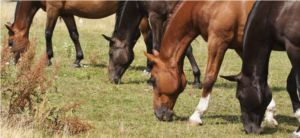 Watch Out For Toxic Plants in Hays, Pastures: Aren’t horses smart enough to know what they can and cannot eat?
Watch Out For Toxic Plants in Hays, Pastures: Aren’t horses smart enough to know what they can and cannot eat?
Generally speaking, it is true that horses will usually avoid ingesting harmful plants or other toxins when offered high-quality forage options. But as highlighted in an article* by veterinarians from the Department of Veterinary Clinical Sciences at Oklahoma State University, horses can—and often do—consume plants they shouldn’t.
As reviewed in this article, horses were offered Bermuda grass hay that was later found to contain large quantities of mature caley pea (Lathyrus hirsutus). In that case, 22 out of 25 young horses developed signs of intoxication. Signs included incoordination, lethargy, and changes in gait.
“There are a great many toxins that can sneak into bales of legumes and grasses, which highlights the importance of routinely inspecting your horse’s hay for more than just dust and mold,” relays Bryan M. Waldridge, D.V.M., head veterinarian for Kentucky Equine Research.
In addition to classic examples of endophyte-infested tall fescue and blister beetles in alfalfa, owners should familiarize themselves with other toxins in their area. Pastures and paddocks also need to be monitored for toxic plants. For example, trees (e.g., maple, black walnut) and ornamentals (e.g., oleander, foxglove, tulips, daylilies, hydrangea, morning glory, iris, daffodil, etc.).
Toxic Plants in your Area:
For information on toxic plants in your area, seek the assistance of an equine extension specialist or plant pathologist. Plant descriptions and photos are available online. We found an article outlining some of the toxic plants present in Florida here.
Article Sources: Kentucky Equine Research
*Holbrook, T.C., L.L. Gilliam, F.P. Stein, et al. Lathyrus hirsutus (caley pea) intoxication in a herd of horses. Journal of Veterinary Internal Medicine. In press.




